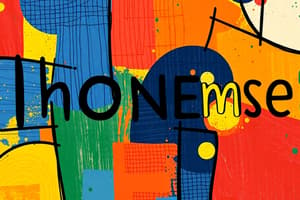Podcast
Questions and Answers
What is the definition of language?
What is the definition of language?
- The study of meaning in language.
- The basic sound unit in a spoken language.
- The formation of plurals and irregular verbs.
- The communication of ideas through sounds and symbols that are arranged according to the rules of grammar. (correct)
What are language acquisition devices according to Chomsky?
What are language acquisition devices according to Chomsky?
The inborn ability of humans to acquire language.
What are morphemes?
What are morphemes?
The smallest meaningful unit of language, such as a prefix or suffix.
What does overregularization refer to?
What does overregularization refer to?
What are phonemes?
What are phonemes?
What is semantics?
What is semantics?
What is syntax?
What is syntax?
Children learn language through observation and imitation of those around them.
Children learn language through observation and imitation of those around them.
There is a period in childhood in which language acquisition is easiest and most effective.
There is a period in childhood in which language acquisition is easiest and most effective.
The prefix re- at the beginning of a word is an example of a _____ .
The prefix re- at the beginning of a word is an example of a _____ .
Identify and describe the three basic elements of language.
Identify and describe the three basic elements of language.
Describe the first three stages in language development.
Describe the first three stages in language development.
Children will often apply rules of grammar to all words, even if the rule does not work.
Children will often apply rules of grammar to all words, even if the rule does not work.
Without language, people would be unable to share knowledge.
Without language, people would be unable to share knowledge.
Syntax for the English language follows the pattern of verb, subject, and object of the verb.
Syntax for the English language follows the pattern of verb, subject, and object of the verb.
_______ is the study of meaning.
_______ is the study of meaning.
A language's ______ is the way in which words are arranged to make phrases or sentences.
A language's ______ is the way in which words are arranged to make phrases or sentences.
What type of thinking is most closely related to language?
What type of thinking is most closely related to language?
What example illustrates the influence of culture on semantics?
What example illustrates the influence of culture on semantics?
What is syntax?
What is syntax?
According to the lecture, one of the most significant uses for language is to communicate and express ideas about one's _____ .
According to the lecture, one of the most significant uses for language is to communicate and express ideas about one's _____ .
Young children develop _____ within the first year and a half of their lives.
Young children develop _____ within the first year and a half of their lives.
A person's inborn tendency to acquire a language is known as what?
A person's inborn tendency to acquire a language is known as what?
Flashcards are hidden until you start studying
Study Notes
Language Fundamentals
- Language is a system of sounds and symbols used to communicate ideas, organized by grammatical rules.
- Chomsky proposed the concept of language acquisition devices, an innate ability enabling humans to learn language.
Key Language Components
- Morphemes are the minimal meaningful units in language, which include prefixes and suffixes.
- Phonemes are the smallest sound units in spoken language.
- Semantics involves the study of meaning in language and how it relates to the objects being represented.
- Syntax refers to the arrangement of words and phrases to create grammatical sentences.
Language Development Stages
- Language development occurs in three main stages:
- Crying, Cooing, and Babbling Stage: Infants express needs without true language; by six months, they babble phonemes.
- Word Stage: Begins around 18 months when children use around two dozen words and create simple phrases, often facing issues like overextension (using known words for unknown concepts).
- Sentence Stage: Near the second birthday, children start forming short sentences and master grammar, but may experience overregularization (applying regular grammar rules to irregular words).
Learning and Knowledge
- Children learn language through observation and imitation.
- There exists a critical period in childhood where language acquisition is most effective.
- The absence of language hinders the ability to share knowledge and cultural ideas.
Grammar and Rules
- Children commonly apply grammatical rules broadly, including when rules don’t apply.
- English syntax typically follows a subject-verb-object pattern; however, this is not accurately followed when analyzing multiple languages.
Practical Language Applications
- Semantics can cause variations in word interpretation based on cultural context, such as the different meanings of "football" across cultures.
- Effective communication encompasses expressing one’s culture and sharing knowledge, which are significant uses of language.
Vocabulary Development
- By the age of 18 months, young children usually have a vocabulary of at least two dozen words.
- The inborn capacity for language acquisition is referred to as the language acquisition device.
Studying That Suits You
Use AI to generate personalized quizzes and flashcards to suit your learning preferences.




